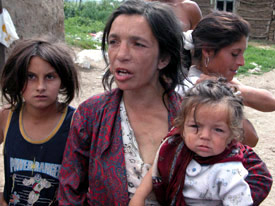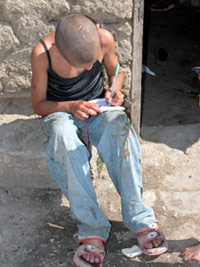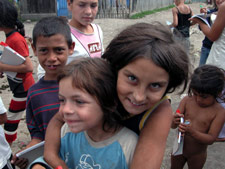News
The Face of Extreme Poverty in Suburban Bucharest
- 14 November 2005
News
BUCIUMENI, Romania — Just 30 kilometres outside Romania's picturesque capital, past quiet, leafy suburbs, lies a complete anomaly. Walking into the squatter settlement of Buciumeni – a ragtag collection of houses slapped together from scrap wood, or mud, with leaky tin roofs – is like going through a doorway into a parallel universe. It is like walking from Europe to Africa in a matter of minutes. The rock-bottom poverty in this Roma village evokes sub-Saharan Africa more than anything encountered in modern Europe.

"Western Europeans are shocked when we bring them here," says Oana Pescaru, the only community psychologist working in the family health centre for Ilfov District, of which Buciumeni is a part. "It is hard to imagine that we have this kind of poverty here in Romania, so close to the capital, but minorities like the Roma in this village are a neglected section of the population."
If this deprivation has a face, it is Florina, a mother of six children. She is only 28 years old, but looks to be on the far side of 40. She has lived in a mud hut lacking all basic amenities – no electricity, potable water or sanitation facilities – since she was a child. The landlord who owns the land she squats on has never recognized her family's right to occupy this dismal patch of muddy ground. So for the past 20-odd years she has lived "in-between the cracks of society" in her own words. "I have no legal right to be here, and since I cannot get any papers even granting me squatting privileges, I cannot apply to the local government for assistance," she says in a gravely voice.
" It is hard to imagine that we have this kind of poverty here in Romania, so close to the capital, but minorities like the Roma in this village are a neglected section of the population. "
--Oana Pescaru
"It is as if she doesn't exist," says Paraschiva Alcanu, the community nurse for Ilfov District, who works with the local Roma communities. "She has been in a Catch-22 situation since she was a child," Paraschiva adds. "We provide her with health services, of course, but officially Florina is an invisible person because she has no papers registering her anywhere."

"Florina is only one of the 800 people in this village who are in dire need of access to primary health care, including reproductive health and family planning services. The families here average 3 to 6 children, far above the national average of just over one child per family. And the average income is less than $2 per day, earned from back-breaking agricultural work, when it is available.
"We have a tremendous challenge here to improve the health and well-being of the poorest segments of society," comments Minerva Ghinescu, the Deputy Director of the District Public Health Authority for Ilfov. "The people in this community are among the poorest in the entire country. They need access to basic medical care as well as reproductive health and family planning services."
Thanks to a project supported by UNFPA, the United Nations Population Fund, Ilfov District's health and social workers have been trained to provide more client-centred reproductive health services, including counselling and provision of contraceptives. "UNFPA support has allowed us to train a community health team, including community nurses and health mediators," says Dr. Ghinescu. "They work in teams and do community outreach in an effort to increase knowledge of and demand for better reproductive health and family planning services."

As a result of this initiative, health indicators for places like Buciumeni are improving. "We have noted a 50 per cent increase in contraceptive use since the inception of this project in 2003," says Dr. Ghinescu. "And there are fewer abortions and less maternal morbidity."
In addition to improving the health of the Roma communities in this district, the UNFPA initiative has brought other benefits. "Because of this project, the community outreach workers have also managed to increase the school attendance of Roma children," says Dr. Ghinescu. "It has had a cascading effect."
On the edge of the village, along a muddy lane, 17-year-old Alina Stefau talks with Paraschiva, the community nurse, about the improvements she has seen in the health of mothers and children. "This has convinced me that I can do something for my community," she says flashing a "V" for victory sign. "I want to finish high school and get a teaching certificate, then return here to teach."
This shows that even in the poorest, most disadvantaged communities, "people can make a difference," concludes Dr. Ghinescu. "UNFPA has given us the tools to make a real difference here."
-- Don Hinrichsen